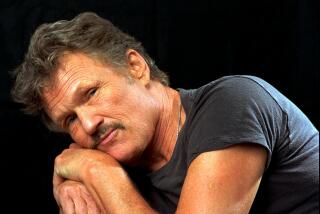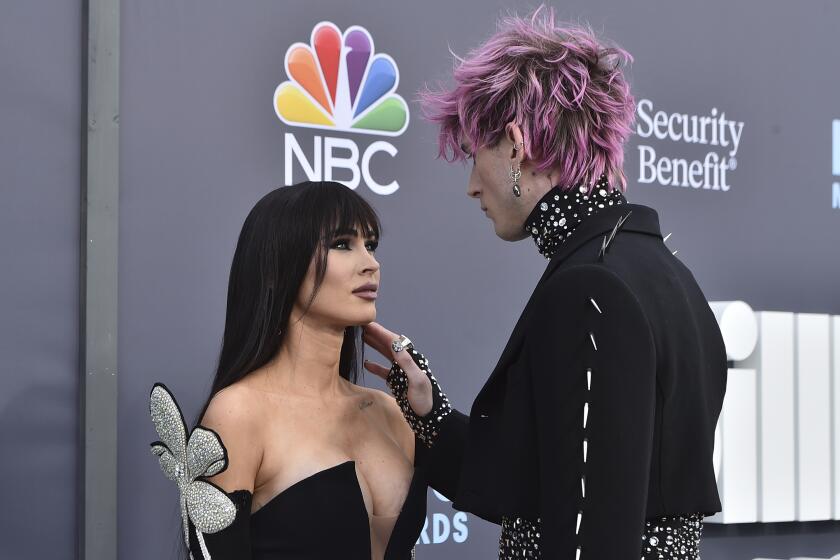POP MUSIC REVIEW : A New Springsteen Steps Up : Adult Rock Accents Radical, Liberating ‘Tunnel of Love’ Tour
- Share via
So what’s left to say?
Bruce Springsteen returned to town over the weekend for two marathon, 3 1/2-hour concerts that sparked yet another round of complaints about the role of ticket brokers and demonstrated to more than 16,000 ecstatic fans each night why he has been the most acclaimed figure in rock for more than 12 years.
Business as usual, right?
Wrong.
In the words of his latest hit, Springsteen’s new “Tunnel of Love Express” tour represents for him one step up and two steps back.
That may sound like a retreat, but the re-direction was essential if he was to avoid the imprisonment of superstardom that loomed following his almost grotesquely successful “Born in the U.S.A.” album and concert tours of 1984 and 1985.
In shows with the E Street Band and a five-member horn section on Friday and Saturday at the Los Angeles Sports Arena, Springsteen walked on stage bearing a bouquet of roses like a suitor and asked the audience, “Ready for a date?”
But that easy-going opening was deceptive. In both shows, he soon stepped away from the two concert elements that have been most closely associated with him--spontaneity and celebration--to concentrate on artistic independence and growth.
The result was the most studied, yet most radical and
liberating appearances yet by the man who combines the sexiness and abandon of ‘50s rock with the commentary and craft introduced in ‘60s rock.
For years, the best argument employed by Springsteen critics was that he simply summarized rock tradition, rather than extended it. But this tour represents the opening of a new door.
Without abandoning youthful energy and passion, Springsteen has moved with imagination and grace into a world of adult rock more securely than any other major record seller.
Through his “Nebraska” and “Tunnel of Love” LPs, Springsteen, 38, showed an ability to deal with complex adult themes--from social isolation to romantic self-doubts--with a grainy, social realism that is closer to what is expected from great books and great films than pop music.
In the opening half of the current show, he presents that same realism and vision in a way that is so effortless and absorbing that he all but disguises the brilliance of his achievement.
By the time Springsteen ended the “Born in the U.S.A.” tour with four sold-out shows at the Los Angeles Memorial Coliseum, he was the biggest draw in American rock since Presley: a figure so massively popular that even some of his long-time fans felt things had gotten out of proportion.
Rather than try to maintain that career intensity, Springsteen last year recorded “Tunnel of Love,” laying aside the rousing, anthemish quality of his “Born in the U.S.A.” material for remarkably personal and probing songs about the nature of relationships. The key moments of the weekend shows echoed the quiet, reflective mood of that album.
In previous visits here, he delighted his audiences by changing the song line-up each night. This time, however, Springsteen--who also plays at the Sports Arena tonight, Wednesday and Thursday--has stepped back to design an 80-minute opening segment with the same concern for interlocking themes and narrative advancement that he employs in putting together an album.
Springsteen has also stepped back from the commercial safety of guaranteed audience response. By employing several obscure tunes (such as “Be True” and “Roulette”), he sacrifices immediate crowd reaction for a slower, but perhaps deeper audience involvement.
In the key “Tunnel of Love” songs, Springsteen is as aware of the debilitating nature of false dreams as the inspirational quality of hopeful ones. The songs, when mixed with other tales of social indifference and the danger of blind faith (“Seeds,” “Born in the U.S.A.”), offer an elasticity that enables him to talk about man’s struggle for purpose, companionship and ideals.
With the message delivered, Springsteen loosened up in the second half of the concert. He brought back the spontaneity (using “Tenth Avenue Freeze-out” as the key closing number on Saturday), lighthearted asides (the self-mocking “I’m a Coward”) and audience favorites (including “Dancing in the Dark” and “Glory Days”) that kept the audience on its feet.
Through it all, he exhibited unerring instincts for the visual side of rock--not only in his dancing, but in the use of mini-skirted singer-guitarist Patty Scialfa as a playful and sometimes steamy partner. If the second half of the concerts reminded the fans of what made Springsteen a superstar, the opening half, more crucially, reassured them that he has not been blinded by the light.
More to Read
The biggest entertainment stories
Get our big stories about Hollywood, film, television, music, arts, culture and more right in your inbox as soon as they publish.
You may occasionally receive promotional content from the Los Angeles Times.








